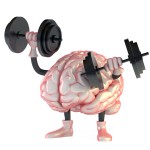
Cognitive decline describes increasing problems with memory, comprehension, language and mental agility. Mild cognitive impairment means that a person has cognitive decline beyond that which might be expected for their age, but generally do not experience problems with everyday living (Alzheimer’s Society, 2012). Dementia has similar symptoms, but these are more severe and people with dementia experience problems with day-to-day tasks (Alzheimer’s Society, 2012a).
The Mental Elf has previously blogged about mild cognitive impairment and the risk of further cognitive decline as well as the importance of early diagnosis and intervention for dementia.
This systematic review was undertaken by researchers from the University of Toronto, it looked at randomised controlled trials of pharmacological or non-pharmacological interventions in healthy adults aged 65 and over with normal cognition.
Methods
An extensive search was undertaken across a range of bibliographic databases up to 31st October 2011 which identified 5,205 articles, following screening against inclusion criteria, 32 English language articles were included in the review.
A narrative review was undertaken. Authors do not directly describe why this method was used, but it was likely because of low numbers of studies for each intervention and methodological differences between studies which meant a statistical comparison was not possible.
Results

Brain training games like sudoku have been specifically marketed as ways to prevent cognitive decline, but does the evidence exist to support this?
Here’s what they found:
- Dehydroepiandrosterone – 3 RCTs (N= 317), no statistically significant results
- Dementia medication (including cholinesterase inhibitors and N-methyl-D-aspartate glutamate receptor antagonists) – 3 RCTs (N=89):
- Donepezil provided statistically significant improvement in immediate and delayed semantic recall at 10 week follow-up
- Two RCTs reported statistically significant improvements in patients prescribed donepezil and memantine.
- Ginko – 2 RCTs, no statistically significant improvements
- Hormonal therapies (Oestrogen) – 7 RCTs (N=10,792). The four larger studies with a follow-up of 4-5 years indicated greater cognitive decline and incidence of dementia in those treated with oestrogen therapy (hazard ratio 1.8, 95% confidence interval 1.2 to 2.6)
- Hormonal therapies (Testosterone) – 3 RCTs (N=144) showed contradictory results, so no firm conclusions could not be drawn from these studies. One study indicated no significant differences, one indicated statistically significant improvements in spatial (p=0.01) and verbal (p=0.05) memory, whereas the other showed worsening short-term memory (p=<0.05)
- Cognitive training – 3 RCTs (N=3,321)
- One study (N= 2,832) of interventions focused on memory, reasoning and speed of processing found significant improvements in the targeted outcomes after 5 years
- Another study compared a brain plasticity-focused computerised programme with a general cognitive stimulation programme. Authors found statistically significant improvement in auditory memory and attention (p=0.02), but highlight that the overlapping confidence intervals (95% CI 2.7 to 5.1, v. 95% CI 0.6 to 3.0) undermine this significance
- The final RCT compared computerised visual demonstration training with no training. This study showed statistically significant improvements, but follow-up was only for 4 weeks, so it is unclear whether this effect is long-term

Keep crosswords and Sudoku for lazy Sundays, intensive cognitive training is needed to potentially prevent cognitive decline
- Miscellaneous pharmacological interventions – 4 RCTs (N=7,530)
- Candesartan in nearly 5000 patients, followed up for 4 years, no significant change
- Naprozen and celecoxib in 2500 patients over 3 years, a statistically significant improvement in global summary scores (p=0.02)
- Placebo versus no pill in 40 patients over 4 weeks, no statistically significant results
- AIT-082 in 9 patients over 5 weeks, no statistically significant improvements
- Physical exercise – 3 RCTs (N=244)
- One study compared moderate and high intensity resistance training with control. Results were inconsistent, with improvements in some scores and not others. The overall change in cognition was not reported
- Another study compared resistance and balance training, with flexibility and relaxation programme, and a no-exercise control. They found no significant results
- The final study compared an aerobic exercise programme with a stretching and balancing exercise programme. There was a statistically significant improvement in executive function in the aerobic exercise group at 6 months, no significant results were found in memory
- Vitamins and fatty acids (including vitamin B6, vitamin E, folic acid and omega-3 fatty acid) – 4 RCTs (N= 302), no statistically significant improvements
Conclusions
This review highlights that despite the importance of cognitive impairment, there is not a substantial body of literature addressing how it may be prevented.

This review highlights the lack of evidence about the best ways to prevent cognitive decline in later life
This systematic review found that cognitive decline prevention strategies generally showed either an inconsistent effect on memory, or none at all. Importantly, it also highlighted some evidence of oestrogen having a worsening effect on memory. Exercise showed an inconsistent benefit on memory, but given its overall health benefits, researchers recommended it be generally encouraged.
Cognitive training showed some benefits, which was widely reported in the media. However, the interventions were “both labour- and resource-intensive”, so were not the puzzle-type exercises many people are familiar with. The researchers recommend that future studies:
- Strengthening this evidence base for cognitive training
- Explore easily accessible tools, such as crosswords and Sudoku, which do not currently have a rigorous evidence-base
The review was limited by generally poor quality studies and variable, but generally short, follow-up periods (from 2 weeks to 9.6 years). The researchers also highlight selective reporting of data occurring in some studies, which potentially weakens the statistical significance of those results. Also, even where results were statistically significant, their clinical significance remained uncertain.
It is estimated that 1 in 3 people over 65 will develop dementia (Alzheimer’s Society, 2013), so studies offering hope of preventative measures attract a lot of media attention. Generally the findings of this study were appropriately reported and not overstated. Readers may also be interested in reading the analysis of how this study was reported in the UK press by NHS Choices.
Links
Naqvi R, Liberman D, Rosenberg J, Alston J, Straus S. Preventing cognitive decline in healthy older adults. Canadian Medical Association Journal April 15 2013; doi: 10.1503/cmaj.121448.
Alzheimer’s Society (2013) Dementia 2013 infographic http://www.alzheimers.org.uk/infographic
Mild cognitive impairment. Alzheimer’s Society, 2012.
What is dementia? Alzheimer’s Society, 2012a.
Benefits of brain training for dementia uncertain. NHS Choices, 2013.

Intensive cognitive training may help to prevent cognitive decline http://t.co/23ifsLSrf1 via @Mental_Elf But could it happen in real world?
Intensive cognitive training may help to prevent cognitive decline: Cognitive decline describes increasing pro… http://t.co/lagprEdmzB
I’ve got this one filed away for future blog posts…. very handy having your summary to rely on.
Systematic review highlights general lack of evidence about the best ways to prevent cognitive decline http://t.co/nmNC7Itdd7
Crosswords are fun but evidence doesn’t prove they prevent decline, read how cognitive training may help http://t.co/nmNC7Itdd7
@Mental_Elf Interesting though a little disconcerting. But how do they compare exercise with a placebo? People can tell they have excercised
@Mental_Elf interesting the anti-inflammatory showed some effect. Is there any evidence for aspirin delaying cognitive decline?
@Mental_Elf @BPSOfficial You can’t prevent it (yet). But it may be possible to ‘slow’ it down. But ‘how’ and by ‘how’ much is contentious.
@thebrainsmind @BPSOfficial Hi Colin, Have you read our blog on this? http://t.co/nmNC7Itdd7 I’d be interested in your thoughts. @ellyob
@Mental_Elf @BPSOfficial @ellyob I like your study. It appears to show what I was suggesting. Did you look at insulin sensitivity?
@thebrainsmind @Mental_Elf @BPSOfficial the SR we blogged didn’t specifically investigate insulin sensitivity – it was quite wide ranging.
“@Mental_Elf: Intensive cognitive training may help to prevent cognitive decline http://t.co/9HRLcy9AyQ” Cc @primedsugar
Keep #Sudoku for lazy Sundays! You need intensive cognitive training to potentially prevent cognitive decline http://t.co/nmNC7Itdd7
As we get older its good to know! “@Mental_Elf: Intensive cognitive training may help to prevent cognitive decline http://t.co/ZzrOcmB8VY”
Intensive cognitive training may help prevent cognitive decline, but more, better quality studies are needed http://t.co/nmNC7Itdd7
Read this marvellous blog from @ellyob about how intensive training may help prevent cognitive decline http://t.co/nmNC7Itdd7
In case you missed it earlier today: Intensive cognitive training may help to prevent cognitive decline http://t.co/nmNC7Itdd7